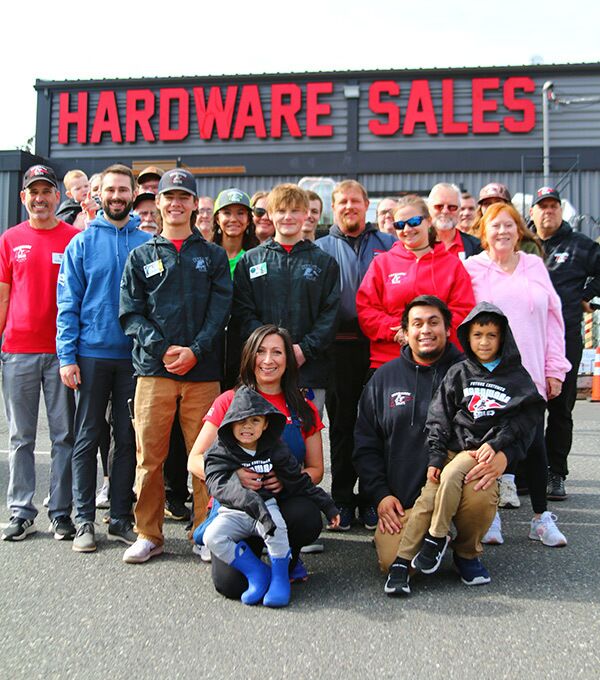How to Harness Brand Power
Hardware Sales has mastered event-based marketing and community partnerships. Learn how this Bellingham, Wash., Do it Best retailer boosts sales while making a difference in its community.

Hardware Sales has become a go-to destination for contractors, DIYers, and homeowners in the Pacific Northwest. Today, the Bellingham, Wash., store occupies more than 37,000 square feet of retail space, spanning four city blocks.
Nestled in the heart of Bellingham, Wash., Hardware Sales has become a community landmark that has adapted and evolved with clever and innovative marketing strategies. From its humble beginnings as a supplier of dynamite to local loggers to becoming a powerhouse retailer in the Pacific Northwest, Hardware Sales has built a legacy of commitment to customers, community, and quality service.
Founded in 1962, Hardware Sales began as a family-run operation when Max and Alta McClellan took over Powder Sales, a small store catering to miners, loggers, and road builders. Originally located on James Street in Bellingham, Powder Sales sold dynamite and other explosives to nearby industrial businesses. As the company gradually transitioned away from the explosives market, it rebranded as Hardware Sales and expanded into general hardware and home improvement supplies.
By the early 1970s, Hardware Sales relocated to its current and much larger retail location in downtown Bellingham. Over the decades, the store has become a go-to destination for contractors, DIYers, and homeowners in the Pacific Northwest. Today, the store occupies over 37,000 square feet of retail space, spanning more than six city blocks. Its operations also include e-commerce distribution centers in Washington and Indiana, serving customers nationwide.
Brookelyn McClellan is the fourth generation to be part of the Hardware Sales team and leads the company’s marketing efforts.
As the business grew, so did the McClellan family’s involvement. Today, the third generation, led by Ty McClellan, continues to operate Hardware Sales. As the sole owner, Ty’s vision has modernized operations and prepared the business for future growth. His daughter, Brookelyn McClellan, is the fourth generation to be part of the Hardware Sales team.
McClellan family leadership has carried the business into the digital age while maintaining the store’s reputation for customer service and product variety. The company offers more than 100,000 items and has a growing suite of services including equipment rentals, a lawn equipment service center, and an industrial sales division.
More than half of Hardware Sales’ revenue comes from e-commerce sales, where the company operates as a third-party seller on Amazon. With the experience gained from their online sales, Hardware Sales created Onkata, a division of the company that helps manage other businesses’ Amazon presence.
Hardware Sales branded hoodies and T-shirts have become a collector’s item among locals. In 2023, wearing the Hardware Sales Tool Fair T-shirt offered customers discounts at 10 local breweries and restaurants.
Marketing Strategies for the Long Haul
Hardware Sales’ ability to adapt to customer needs has been integral to its success.
One of the most important marketing strategies is the annual Tool Fair, an event designed to connect customers with the store’s vendors. What started as a small gathering has evolved into a major regional event, attracting customers from all over the Pacific Northwest. Vendors showcase new products, provide live demonstrations, and offer exclusive deals, creating an atmosphere of excitement and engagement.
One of the highlights of the event is the limited-edition Tool Fair merchandise—especially the branded T-shirts, which have become a collector’s item among locals. In 2024, the event incorporated a unique twist: wearing the Tool Fair T-shirt offered customers discounts at 10 local breweries and restaurants. This creative strategy not only promoted the event but also fostered partnerships with other local businesses, further embedding Hardware Sales into the fabric of the community.
Hardware Sales relies on several distributors, including Do it Best, Orgill and Emery Jensen Distribution. The company utilizes co-op funds from Do it Best for branded products such as buckets, hoodies and employee uniforms.
Hardware Sales branded clothing is available for even for the youngest members of the Bellingham, Wash., community.


